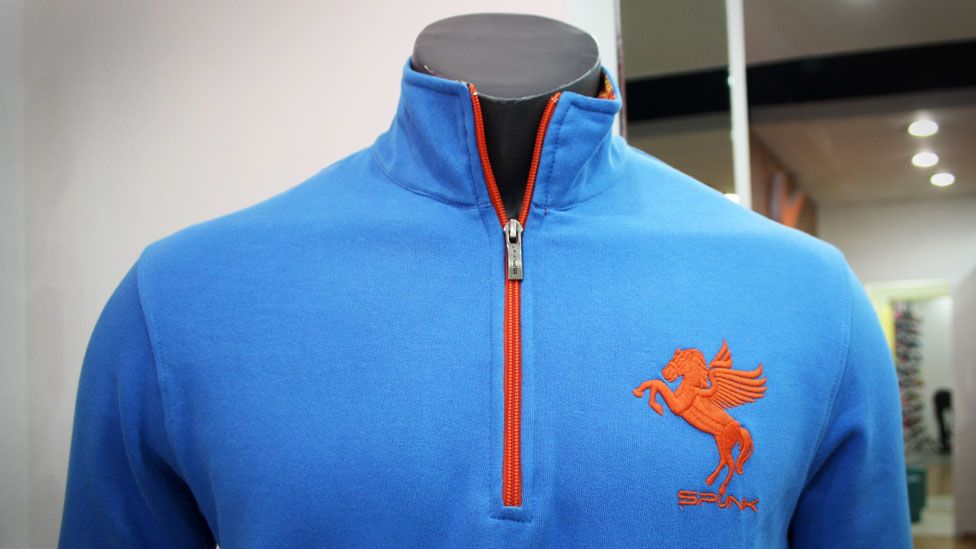The brand name you'll never forget
- Published

If you want to understand the challenges of choosing a name for your product in the ever more interconnected global market, look no further than an Indian sportswear range.
It demonstrates that what works in one market can be a disaster in another.
Brand names are supposed to embody the core values a product wants to project. That is why big companies spend millions of dollars choosing the right name.
The owners of the new clothing range clearly believe they are onto a winner. It was launched with some fanfare earlier this year by Saif Ali Khan, one of India's leading Bollywood actors.
According to the Oxford English Dictionary its name means courageous and plucky. In Australia it is slang for an attractive person. Appropriate themes for a brand designed "for those people who have a flair for movement… and enthusiastically give in to the rhythm that surrounds them".
People "who are free of any inhibitions of mind and body" continues Futurebrands, the company behind the new range.
But "Spunk" must surely rank as one of the worst brand names in history - at least when it comes to the British market.
That's because in Britain the original meaning of bravery and valour has been almost entirely eclipsed by its use as a slang word for semen. (The first use of the word in this sense recorded in the Oxford English Dictionary dates back to 1890.)
I am sure I was not the first British person to let out an involuntary guffaw when I saw the brand name proudly emblazoned on an otherwise rather nice tracksuit.
You can, I discovered, also buy Spunk shoes, T-shirts and socks.
And Spunk is not alone. The market for appallingly named brands is surprisingly congested.
I showed my new Spunk socks to a friend over lunch.
Like everyone I have subsequently mentioned the brand to, he immediately produced his own favourite unfortunate brand name. In this case "Fanny", a Vietnamese ice-cream company which will struggle to whet the appetite of its sniggering English-speaking potential customers.
A cursory trawl of the internet brings up a host more.
Pschitt lemonade, anyone?
Or how about Bonka coffee, perhaps accompanied by a Plopp chocolate?
Then again you might prefer a bag of the Chinese snack Only Pukeet washed down with a bottle of Pee Cola from Ghana?
And don't forget a pack of the Swedish toilet paper, Krapp, and a box of Barf detergent from Iran.
You could always store it in a Bol-lock zippable plastic bag.
No doubt these products sell well in their home markets but they may find it hard to expand into the English-speaking market.
Many companies find it easier simply to change their names.
The Belgian chocolate company Isis is just one of a number of businesses named after the Egyptian river goddess which have decided a re-brand is the only way to avoid confusion with the Islamist militant group.
A US mobile payments company has done the same, and the British company Ann Summers has apologised for any offence caused after launching a range of "erotic lingerie" called The Isis Collection.
Meanwhile, the actor Hugh Bonneville has vigorously denied claims that the scriptwriters behind Downton Abbey decided the Crawley family Labrador was to develop cancer and die because it also shares its name with the jihadist group.
Many companies have dealt with perceived problems with their brand name by replacing them with brand new words.
That worked very well for BackRub (Google*) and Brad's Drink (Pepsi Cola), but seven years after the British insurance company Norwich Union decided to rebrand itself as Aviva, the jury is still out.
The chorus of disapproval was so overwhelming when the British Post Office re-styled itself as Consignia a decade ago that just over a year later it shamefacedly switched back to the original.
And a surprising name isn't always a handicap.
After all, the British clothing brand French Connection did very well after renaming itself FCUK.
*Google is a play on the word googol - the term for the number represented by 1 followed by 100 zeros
Here is a selection of interesting brand names readers have seen:
Robert, Luxembourg: Looza is a soft drink found often in vending machines here.
Siobhan Redmond, Edinburgh: Travelling in France I found "Zit" ice cream.
Anthony Johnston, London: I start gagging at the thought of quenching my thirst with a bottle of Japanese drink Pocari Sweat.
Kannan Athreya, London: How about Coolpis... a fruit drink from South Korea?
Kyle McAllister-Grum, Carbondale, IL, USA: When I was in Panama City over the summer, I saw a bread truck with a friendly marshmallow bear and the word BIMBO across the top.
Ian Richards, Selby: I lived in Denmark for nine months, and over there "Spunk" is the name of jelly sweets.
Lisa Flint, London: Arcelik is a major electrical/white goods manufacturer in Turkey so the brand name and adverts are everywhere.
Kees Haasnoot, Netherlands: While travelling on a train in India, I saw someone transporting a newly-bought pillow. The name of this pillow, proudly presented on the packaging, was "Nightmare".
Beth Gibbons, Nottingham: In Montenegro we found "Noblice" biscuits.
Subscribe to the BBC News Magazine's email newsletter to get articles sent to your inbox.